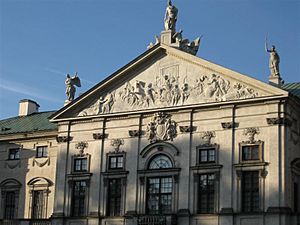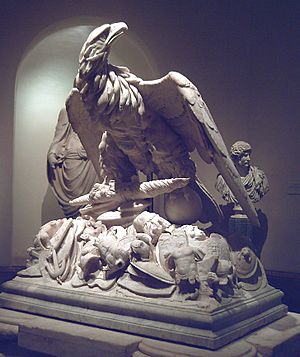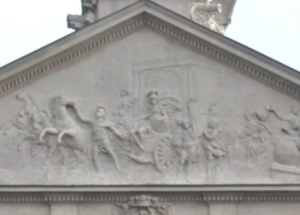Marcus Valerius Messalla Corvinus facts for kids
Marcus Valerius Messalla Corvinus was an important Roman general, writer, and a big supporter of art and literature. He lived a long time ago, from 64 BC to about AD 8 or 12.
Contents
Who Was Marcus Valerius Messalla Corvinus?
Corvinus was born into a powerful Roman family. His father, Marcus Valerius Messalla Niger, was a consul (a top government official) in 61 BC. His mother was named Palla.
He had two sisters, both named Valeria. One sister married Quintus Pedius, who was a cousin of the famous Roman emperor Augustus. Corvinus also had a great-grandnephew from this marriage who was a deaf painter named Quintus Pedius.
Corvinus married twice. His first wife was Calpurnia. They had a daughter, Valeria Messalina, and a son, Marcus Valerius Messalla Messallinus. His second son, Marcus Aurelius Cotta Maximus Messalinus, was likely born to his second wife, Aurelia Cotta. The poet Ovid wrote about Corvinus's second wife.
Life and Career
Corvinus studied in Athens, a famous city for learning, alongside other important Romans like Horace. Early in his life, he believed strongly in the Roman Republic, where citizens had more power. Even though the Roman Empire later took over, he still held these beliefs.
Early Political Life
In 43 BC, Corvinus was declared an enemy of the state, but he managed to escape. He joined the forces of Brutus and Cassius, who were fighting against Antony and Octavian.
After the Battle of Philippi in 42 BC, where Brutus and Cassius were defeated, Corvinus joined Mark Antony. However, he later switched his support to Octavian (who would become Emperor Augustus).
Military Achievements
In 31 BC, Corvinus became a consul and fought in the important Battle of Actium. This battle was a big victory for Octavian.
Later, Corvinus led Roman armies in the East and put down a rebellion in Gallia Aquitania (an area in modern-day France). For this victory, he was given a special celebration called a triumph in 27 BC.
Public Service
Corvinus helped improve Rome by fixing roads and building beautiful structures. He even suggested that Augustus should be given the title pater patriae, meaning "father of the country."
However, Corvinus also showed his strong beliefs in the Republic. He resigned from a powerful job as Prefect of the city after only six days because it went against his ideas of how the government should work. He is said to have declared, "I am ashamed of my power."
Supporter of Arts and Literature
Corvinus was a lot like Gaius Maecenas, another famous Roman who supported writers and artists. Corvinus gathered a group of talented people around him, including the poets Tibullus, Lygdamus, and Sulpicia. This group was known as "the Messalla circle."
He was good friends with Horace and Tibullus. The poet Ovid was very thankful to Corvinus for being the first to notice and encourage his writing.
Corvinus also wrote several books himself, but sadly, none of them have survived to today. He was known as a great speaker, and some later critics even thought he was better than the famous speaker Cicero.
Places Connected to Corvinus
Corvinus had a house on the Palatine Hill in Rome. This house used to belong to Mark Antony, but Augustus gave it to Corvinus. He also owned the famous Gardens of Lucullus (Horti Luculliani) on the Pincian Hill, where the Villa Borghese gardens are today.
The Casal Rotondo, a round tomb near Rome, is often thought to be Corvinus's tomb, but this is not certain. Corvinus was also one of three friends who helped put up statues at the site of the famous Pyramid of Cestius in Rome.
In 2012, a fancy villa belonging to Corvinus was found near Ciampino, Italy. Inside, archaeologists found seven huge statues that had fallen into a pool, probably because of an earthquake.
In 2014, another luxurious villa on the island of Elba was identified as his. It burned down in the 1st century AD. Wine jars found there had a stamp that said "made by Hermias, slave of Marcus Valerius," which helped confirm it belonged to Corvinus's family.
Legendary Ancestor of Hungarian Royalty
A famous Hungarian family, the Hunyadis, who included King Matthias Corvinus Hunyadi, claimed to be related to Marcus Valerius Messalla Corvinus. They believed he owned a lot of land in the area that is now Hungary. However, there isn't much historical proof for this connection.
The Hunyadis got the name "Corvinus" from a story about an earlier Roman hero, Marcus Valerius Corvus. In 349 BC, a raven supposedly helped him win a fight by attacking his enemy's eyes. Because "Corvus" means "raven" in Latin, the Hunyadis used a raven with a ring on their coins and in their family crest. This story also led to Corvinus's triumph being shown on the Krasiński Palace in Warsaw.
See also
 In Spanish: Marco Valerio Mesala Corvino para niños
In Spanish: Marco Valerio Mesala Corvino para niños
- Korwin coat of arms
- Ślepowron coat of arms
 | Chris Smalls |
 | Fred Hampton |
 | Ralph Abernathy |




